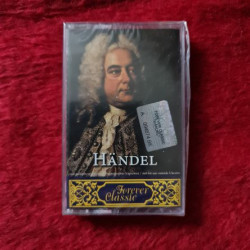George Frideric Handel - l
George Frideric (or Frederick) Handel (/ˈhændəl/;[a] baptised Georg Friederich Händel[b][ˈɡeːɔʁk ˈfʁiːdʁɪç ˈhɛndl̩] (![]() listen); 23 February 1685 – 14 April 1759)[2][c] was a German-born Baroque composer becoming well known for his operas, oratorios, anthems, concerti grossi and organ concertos. Handel received his training in Halle and worked as a composer in Hamburg and Italy before settling in London in 1712, where he spent the bulk of his career and became a naturalised British subject in 1727.[4] He was strongly influenced both by the middle-German polyphonic choral tradition and by composers of the Italian Baroque.
listen); 23 February 1685 – 14 April 1759)[2][c] was a German-born Baroque composer becoming well known for his operas, oratorios, anthems, concerti grossi and organ concertos. Handel received his training in Halle and worked as a composer in Hamburg and Italy before settling in London in 1712, where he spent the bulk of his career and became a naturalised British subject in 1727.[4] He was strongly influenced both by the middle-German polyphonic choral tradition and by composers of the Italian Baroque.
Handel started three commercial opera companies to supply the
English nobility with Italian opera. In 1737 he had a physical
breakdown, changed direction creatively, and addressed the middle class
and made a transition to English choral works.[5] After his success with Messiah (1742) he never composed an Italian opera again. His orchestral Water Music, and Music for the Royal Fireworks remain steadfastly popular.[6] Almost blind, he died in 1759, a respected and rich man, and was given a state funeral at Westminster Abbey.
Handel composed more than forty opera serias over a period of more than thirty years. Since the late 1960s, interest in Handel's music has grown. The musicologist Winton Dean wrote that "Handel was not only a great composer; he was a dramatic genius of the first order."[7] His music exerted a strong influence on Classical-era composers, including Mozart and Beethoven.
See also
|
6.99€
Unique Audio Formats |
7.15€
CD-R |
7.99€
Tape |
6.99€
Tape |
9.99€
CD |
|
5.99€
Merchandise |
6.99€
Tape |
7.99€
Tape |
10.00€
CD |
7.99€
Tape |








